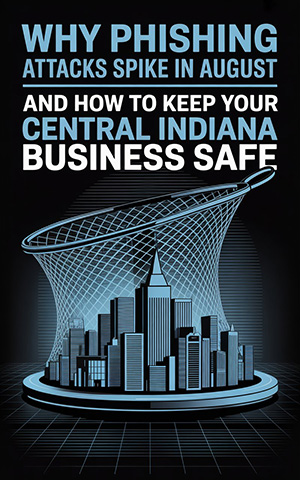 Just because your team is getting back from summer vacations doesn’t mean cybercriminals are taking a break. In fact, late summer is prime time for phishing attacks—and Carmel and Indianapolis businesses are right in the crosshairs.
Just because your team is getting back from summer vacations doesn’t mean cybercriminals are taking a break. In fact, late summer is prime time for phishing attacks—and Carmel and Indianapolis businesses are right in the crosshairs.
According to cybersecurity leaders like ProofPoint and Check Point, phishing activity spikes during the summer months, with attackers preying on travel habits, back-to-school distractions, and increased reliance on mobile devices.
Why the Summer Surge?
Attackers are getting creative. In May 2025 alone, Check Point Research identified over 39,000 newly registered “vacation” themed websites—with one in 21 flagged as malicious. These fake hotel, Airbnb, and travel portals are cleverly designed to trick users into handing over login credentials or downloading malware.
Meanwhile, back-to-school season brings its own wave of threats. Fake emails from "university systems" target students, staff, and faculty. Even if your business isn’t in education, your employees might be impacted—and the danger increases when personal emails are accessed on work computers.
Why This Matters to Your Practice or Business
You don’t need to be the direct target of a phishing campaign to be affected. All it takes is one team member checking their personal inbox on a work device, clicking a fraudulent link, and suddenly—your entire network is compromised.
We’ve seen phishing attacks in Carmel and Indianapolis lead to:
- Stolen client or patient data
- Business email compromise
- Ransomware launched through disguised downloads
- Weeks of downtime and lost revenue
And with AI making phishing messages more polished and convincing than ever, even the most cautious employee can be tricked.
7 Practical Ways to Protect Your Business from Summer Phishing Scams
Here’s what we recommend for every local business and healthcare practice:
1. Don’t Trust, Verify
Teach your team to scrutinize emails—even if they seem professional. Look beyond spelling errors. Check email addresses and link URLs closely. AI makes phishing messages look legitimate.
2. Never Click, Always Search
Instead of clicking links in emails, search for websites manually—especially for logins, travel bookings, or school portals.
3. Use MFA Everywhere
Enable multifactor authentication for all work accounts. MFA is one of the simplest ways to stop a stolen password from becoming a full-blown breach.
4. Avoid Public Wi-Fi Without a VPN
If you or your staff work from coffee shops or airports, make sure you’re using a secure VPN before accessing sensitive accounts.
5. Separate Work and Personal Devices
Accessing personal email or social media on a company computer significantly raises your risk. Set clear device usage policies and enforce them.
6. Invest in Endpoint Security
Advanced Endpoint Detection and Response (EDR) tools watch for suspicious activity on your computers and mobile devices—and shut it down fast. They’re far more effective than traditional antivirus software.
7. Partner with a Proactive IT Provider
Your Managed Service Provider (MSP) should offer more than break/fix support. They should monitor your systems, train your team, and help prevent phishing attempts from ever reaching your inbox.
Protect Your Business Before the Click Happens
Phishing attacks don’t wait for a convenient time to strike—and they’re only getting more sophisticated. The right mix of employee training, security software, and IT support can protect your systems, your data, and your peace of mind.
Let PropellerHeads help you secure your practice or business this summer and beyond. We’ve helped companies across Carmel, Fishers, Zionsville, and Indianapolis implement smart, affordable cybersecurity solutions tailored to small teams.
Book your free cybersecurity assessment today and get ahead of the threats. Schedule now.


